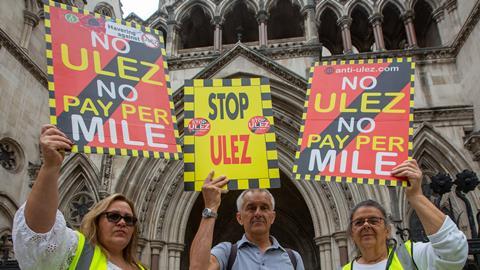'When did you last see a judge on a bus?', demanded the caption. It accompanied a cartoon of a bewigged and robed Lord Denning imperiously directing a bus conductor to take him to The Ritz. The year was 1981 and the Court of Appeal had just ruled that the London local authority's cut in public transport fares was unlawful.
The ruling caused outrage, especially on the political left. Few of us had even heard of judicial review and were uncomfortable with it as a concept. Although we didn't know the word, the move seemed a step towards kritarchy (rule of the judges). A letter to the Guardian suggested that, to save money in future, all ballot papers be pre-printed with the name 'Denning'. The judges were seen as a superannuated chauffeur-driven elite who would naturally side with Margaret Thatcher's government against 'Red' Ken Livingstone's Greater London Council.
Labour had come to power in London on a pledge to cut London Transport fares by 25% and to shake up the fare structure to make buses and the underground more attractive. So-called 'Fares Fair' was only one in a barrage of then-radical policies. Some, such as a recognition of gay rights - at the the time derided by a patently homophobic Private Eye magazine - would be tamely mainstream today. Others, such as a nuclear-free London, were more quixotic. One that crossed my reporting beat was a bonkers attempt to save a company making electro-mechanical telephone exchanges.
Looking back, Fares Fair was a decisive step in reversing the policy of 'managed decline' of public transport. Incredibly, in the 1960s and 1970s, the future of London transport was the motor car. Today we can see the remnants of planned motorway 'boxes' in oddities such as Park Lane's stretch of dual carriageway, the extra-wide pavements in Tottenham Court Road and the Brixton 'barrier block' of flats.
Tube-riding central Londoners like me loved Fares Fair. The snag was it had to be paid for through a supplementary rate - and the people who paid were not necessarily the ones who benefited. The burghers of Bromley, well outside the Tube network (and this was long before the South London tram) brought a JR against the rate. In the High Court, Mr Justice Phillips found that the decision might lie on the margins of what was permissible for a local authority but it was not unlawful. Bromley appealed, and, led by the 82-year-old Lord Denning, the Court of Appeal decided that the key was in the wording of the 1969 Transport (London) Act. One word in particular: 'economic'. The judges agreed that the GLC did not have the power to cut the fares.
And so to the House of Lords; the appeal was heard in November and just a couple of weeks later Lord Wilberforce declared in lead judgment that the Greater London Council had acted ultra vires.
More outrage. 'A flagrant violation of the will of the electorate,' was one comment, continuing: 'The judges have opened the doors to a flood of politically motivated litigation by short-sighted selfish interest groups.' The commenter was the Haldane Society of Socialist Lawyers.
Four decades on, is history repeating itself? The London Borough of Bromley is one of the five outer London local authorities which earlier this month brought an action against the current London government and mayor Sadiq Khan against a planned extension of the ultra-low emission zone road charging area on 29 August. For the benefit of readers not obsessed with London, ULEZ is a £12.50 daily charge on vehicles which don't meet emissions standards. (You can check your vehicle here; if you own a diesel more than eight years old, you'll probably be hit.) According to opponents, some 1.2 million non-compliant vehicles are registered in the commuter belt. Many are run by blue-collar tradespeople or relatively low-paid public sector workers.
On Friday, just as in 1981, the High Court backed the central London authority. Mr Justice Swift comprehensively dismissed three lines of challenge: the use of the 1999 Greater London Authority Act to expand the scheme, the extent of public consultation and on the cost of a vehicle scrappage scheme. There was certainly a barrel-scraping feel to some of the points of contention: for example that the extension would cover three short sections of trunk road for which the consent of the secretary of state for transport would be required. According to the judgment, 'it is not possible to reach a definite conclusion on this' because none of the parties has been able to find the consent - though all agree that some form was given. In any case this is 'essentially academic', the judge pointed out: it is not possible to drive on these sections without also driving on non-trunk ULEZ roads.
Parallels with 1981 seem to end here, however. A striking one is the way that the courts' role in setting transport policy now seems to be accepted on all sides. Whether this is a sign of progress is another matter. Certainly a welcome aspect of this change is that, while we can assume that Mr Justice Swift doesn't do the daily school run in a knackered Ford Transit, his personal lifestyle doesn't seem to have entered the debate in the way Lord Denning's did in 1981. 'Enemies of the people' did not start with Brexit.
By the way, I don’t think I have ever seen a senior judge on a bus. But I’ve certainly seen a lord justice of appeal (in very inconspicuous mufti) waiting at a bus stop on The Strand. On the whole that’s a good thing.





































4 Readers' comments